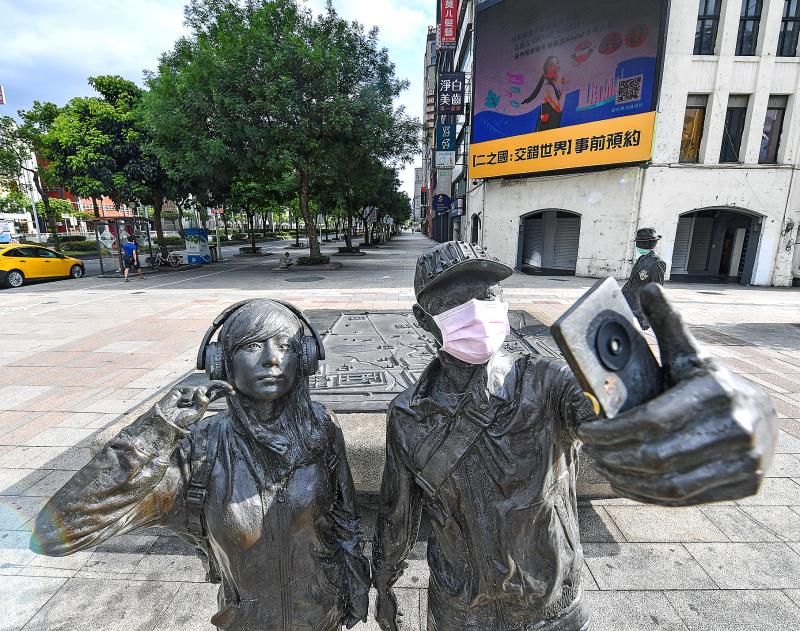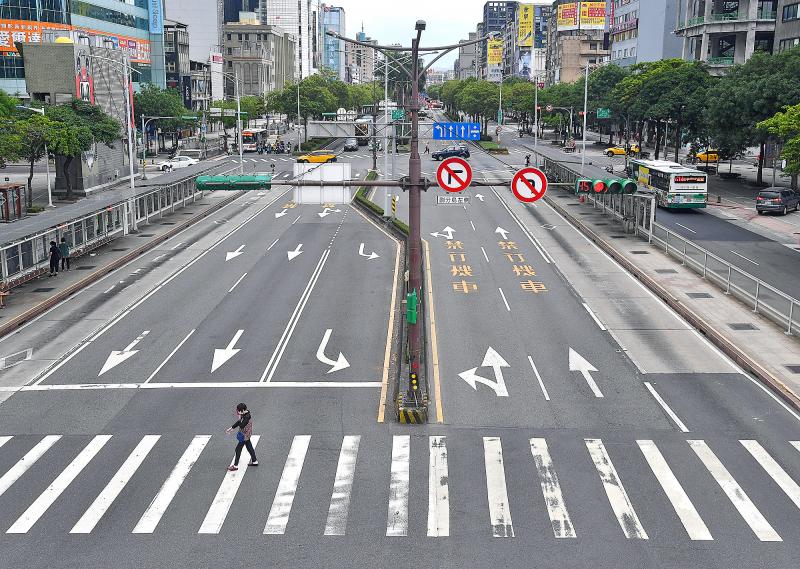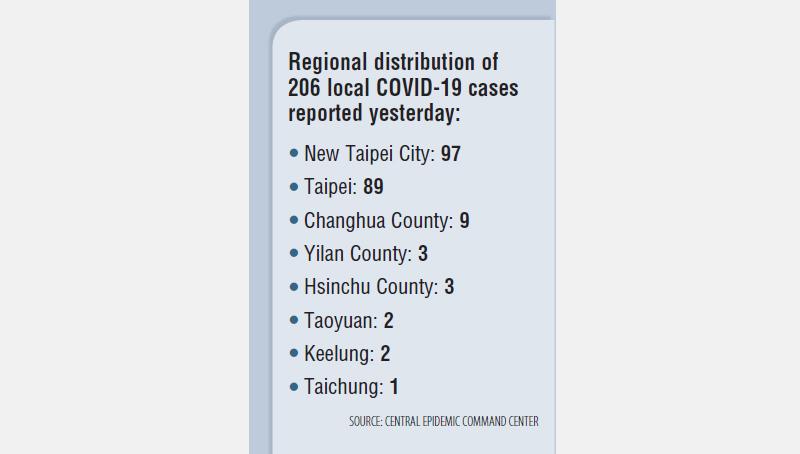Minister of Health and Welfare Chen Shih-chung (陳時中) strongly urged everyone to thoroughly practice the “new disease prevention lifestyle” and avoid unnecessary outings and gatherings, as the Central Epidemic Command Center (CECC) confirmed 206 new local COVID-19 cases yesterday.
The local cases include 90 males and 116 females, aged from under five years old to older than 80, he said, adding that the onset of symptoms or their testing dates were between April 6 and Saturday.
They include 97 New Taipei City residents, 89 Taipei residents, nine from Changhua County, three each in Yilan County and Hsinchu County, two each in Taoyuan and Keelung, and one in Taichung, added the minister, who heads the CECC.

Photo: CNA
Thirty-two of the new cases in New Taipei City are in Banciao District (板橋), and 58 of the new cases in Taipei are in Wanhua District (萬華), the CECC said.
Chen said that 105 cases are linked to a cluster at teahouses in Wanhua District, 44 cases visited Wanhua recently, five cases are linked to a cluster among social club members in New Taipei City’s Lujhou District (蘆洲), three cases are linked to a cluster at a gaming arcade in Yilan County and one case is linked to a pilgrimage tour group that visited southern Taiwan.
Contact tracing is still in progress, he added.

Photo: CNA
As locally transmitted cases have been increasing rapidly, the center on Saturday afternoon talked to local governments, Chen said.
A consensus was reached that local governments would be allowed to publicize locations that confirmed cases visited when they where contagious, although they must comply with the CECC’s data release principles, he said.
As the number of cases is climbing daily, the process of contacting confirmed patients, arranging for them to be hospitalized and contact tracing might be a little slower, so the CECC has some tips for people who have been informed of a positive COVID-19 test result, but have not yet been admitted to a hospital, Chen said.

Centers for Disease Control (CDC) physician Chen Wan-ching (陳婉青) said that most people with COVID-19 have mild symptoms, so if an arrangement has not yet been made for them to go to a hospital, they should wait at home in a room separated from other people.
They should also try to avoid sharing a bathroom with other people, Chen Wan-ching said.
She said they should avoid contact with family members, especially children, elderly people and those with weak immune systems; wear a mask and practice good hand hygiene; lie down and rest; and drink water or take antipyretics if they develop a fever.
They should also pay attention to changes in their health, and call 119, the local health department or the CECC’s toll-free 1922 hotline if they have difficulty breathing, continuous chest pain, chest tightness, or a bluish color on their skin, lips or fingernails, or if someone loses consciousness, she said.
Chen Wan-ching said that family members should prepare food and water for the infected person, but they should not share meals or other objects and disinfect the objects touched by the infected individual with alcohol or diluted bleach.
Infected individuals should also call people who they have been in close contact with from three days before the onset of symptoms to when they were put under isolation, informing them to isolate at home, she said, adding that close contacts include people who they have had a meal with, live with or have had face-to-face contact with for more than 15 minutes without wearing a mask.
As for people who have had close contact with a confirmed case, but have not been informed by the local health department to isolate at home, they should wait at home and follow the same rules as previously mentioned for the confirmed cases, and not take public transportation if it has been arranged for them to seek medical attention or testing at a healthcare facility, she said.
If people did not have close contact with a confirmed case, they only need to practice self-health management for 14 days, and they should wear a mask and seek medical attention if they have COVID-19 symptoms, she added.
“I am asking everyone to please thoroughly practice the new disease prevention lifestyle, because it can definitely help the nation’s disease prevention and reduce the spread of the virus,” Chen Shih-chung said.
“Under this emergency situation, please also avoid unnecessary outings and gatherings,” he said, reminding people to wear a mask and wash their hands frequently if they must go out or attend a gathering.

CHAOS: Iranians took to the streets playing celebratory music after reports of Khamenei’s death on Saturday, while mourners also gathered in Tehran yesterday Iranian Supreme Leader Ayatollah Ali Khamenei was killed in a major attack on Iran launched by Israel and the US, throwing the future of the Islamic republic into doubt and raising the risk of regional instability. Iranian state television and the state-run IRNA news agency announced the 86-year-old’s death early yesterday. US President Donald Trump said it gave Iranians their “greatest chance” to “take back” their country. The announcements came after a joint US and Israeli aerial bombardment that targeted Iranian military and governmental sites. Trump said the “heavy and pinpoint bombing” would continue through the week or as long

TRUST: The KMT said it respected the US’ timing and considerations, and hoped it would continue to honor its commitments to helping Taiwan bolster its defenses and deterrence US President Donald Trump is delaying a multibillion-dollar arms sale to Taiwan to ensure his visit to Beijing is successful, a New York Times report said. The weapons sales package has stalled in the US Department of State, the report said, citing US officials it did not identify. The White House has told agencies not to push forward ahead of Trump’s meeting with Chinese President Xi Jinping (習近平), it said. The two last month held a phone call to discuss trade and geopolitical flashpoints ahead of the summit. Xi raised the Taiwan issue and urged the US to handle arms sales to

BIG SPENDERS: Foreign investors bought the most Taiwan equities since 2005, signaling confidence that an AI boom would continue to benefit chipmakers Taiwan Semiconductor Manufacturing Co’s (TSMC, 台積電) market capitalization swelled to US$2 trillion for the first time following a 4.25 percent rally in its American depositary receipts (ADR) overnight, putting the world’s biggest contract chipmaker sixth on the list of the world’s biggest companies by market capitalization, just behind Amazon.com Inc. The site CompaniesMarketcap.com ranked TSMC ahead of Saudi Aramco and Meta Platforms Inc. The Taiwanese company’s ADRs on Tuesday surged to US$385.75 on the New York Stock Exchange, as strong demand for artificial intelligence (AI) applications led to chip supply constraints and boost revenue growth to record-breaking levels. Each TSMC ADR represents

Pro-democracy media tycoon Jimmy Lai’s (黎智英) fraud conviction and prison sentence were yesterday overturned by a Hong Kong court, in a surprise legal decision that comes soon after Lai was jailed for 20 years on a separate national security charge. Judges Jeremy Poon (潘兆初), Anthea Pang (彭寶琴) and Derek Pang (彭偉昌) said in the judgement that they allowed the appeal from Lai, and another defendant in the case, to proceed, as a lower court judge had “erred.” “The Court of Appeal gave them leave to appeal against their conviction, allowed their appeals, quashed the convictions and set aside the sentences,” the judges